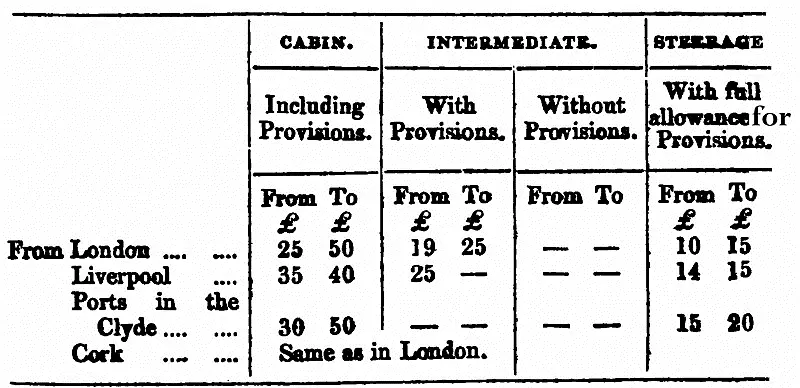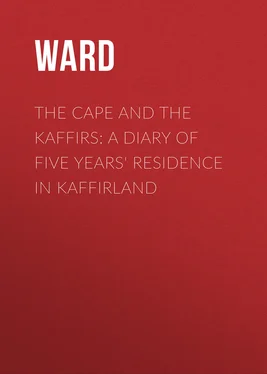Ward - The Cape and the Kaffirs - A Diary of Five Years' Residence in Kaffirland
Здесь есть возможность читать онлайн «Ward - The Cape and the Kaffirs - A Diary of Five Years' Residence in Kaffirland» — ознакомительный отрывок электронной книги совершенно бесплатно, а после прочтения отрывка купить полную версию. В некоторых случаях можно слушать аудио, скачать через торрент в формате fb2 и присутствует краткое содержание. Издательство: Иностранный паблик, Жанр: foreign_prose, История, foreign_edu, foreign_antique, на английском языке. Описание произведения, (предисловие) а так же отзывы посетителей доступны на портале библиотеки ЛибКат.
- Название:The Cape and the Kaffirs: A Diary of Five Years' Residence in Kaffirland
- Автор:
- Издательство:Иностранный паблик
- Жанр:
- Год:неизвестен
- ISBN:нет данных
- Рейтинг книги:4 / 5. Голосов: 1
-
Избранное:Добавить в избранное
- Отзывы:
-
Ваша оценка:
- 80
- 1
- 2
- 3
- 4
- 5
The Cape and the Kaffirs: A Diary of Five Years' Residence in Kaffirland: краткое содержание, описание и аннотация
Предлагаем к чтению аннотацию, описание, краткое содержание или предисловие (зависит от того, что написал сам автор книги «The Cape and the Kaffirs: A Diary of Five Years' Residence in Kaffirland»). Если вы не нашли необходимую информацию о книге — напишите в комментариях, мы постараемся отыскать её.
The Cape and the Kaffirs: A Diary of Five Years' Residence in Kaffirland — читать онлайн ознакомительный отрывок
Ниже представлен текст книги, разбитый по страницам. Система сохранения места последней прочитанной страницы, позволяет с удобством читать онлайн бесплатно книгу «The Cape and the Kaffirs: A Diary of Five Years' Residence in Kaffirland», без необходимости каждый раз заново искать на чём Вы остановились. Поставьте закладку, и сможете в любой момент перейти на страницу, на которой закончили чтение.
Интервал:
Закладка:
Chapter II.
Information for Emigrants
As it is my wish to put nothing but trustworthy information into the hands of those who may be meditating so very important a step as removing themselves and all that they value far from their native land, I have carefully abstracted the following statements from the last Colonisation Circular , issued (March, 1850) by Her Majesty’s Colonial Land and Emigration Commissioners.
“The Government Emigration Officers in the United Kingdom, are:—London: Lieut. Lean, R.N., Office, 70, Lower Thames-Street. Liverpool: Lieut. Hodder, R.N., Stanley Buildings. Plymouth: Lieut. Carew, R.N. Glasgow and Greenock: Capt. Patey, R.N. Dublin: Lieut. Henry, R.N. Cork: Lieut. Friend, R.N. Belfast: Lieut. Stark, R.N. Limerick: Mr Lynch, R.N. Sligo, Donegal, Ballina etc: Lieut. Shuttleworth, R.N.; Lieut. Moriarty, R.N. Londonderry: Lieut. Ramsay, R.N. Waterford and New Res. Comm. Ellis, R.N.
“These officers act under the immediate directions of the Colonial Land and Emigration Commissioners, and the following is a summary of their duties:
“They procure and give gratuitously information as to the sailing of ships, and means of accommodation for emigrants, and whenever applied to for that purpose, they see that any agreements between shipowners, agents or masters, and intending emigrants are duly performed. They also see that the provisions of the Passengers’ Act are strictly complied with, viz., that passenger-vessels are sea-worthy, that they have on board a sufficient supply of provisions, water, medicines, etc, and that they sail with proper punctuality.
“They attend personally at their offices on every week-day and afford gratuitously all the assistance in their power to protect intending emigrants against fraud and imposition, and to obtain redress where oppression or injury has been practised on them.
“The Government Immigration Agents at the Cape of Good Hope, are—Cape Town: R. Southey, Esq. Port Elizabeth: D.P. Francis, Esq.
“The duties of these officers are to afford gratuitously to emigrants every assistance in their power by way of advice and information as to the districts where employment can be obtained most readily, and upon the most advantageous terms, and also as to the best modes of reaching such districts.
“The rate of passage in private ships to the Cape of Good Hope and Natal is:

“At the Cape of Good Hope, persons of the following classes, if of good character and ability in their callings, are stated to be in demand; viz. agricultural labourers, shepherds, female domestic and farm servants, and a few country mechanics, such as blacksmiths, wheelwrights, carpenters, and masons.”
Of the rates of wages the Commissioners give the following Tables from the latest official returns in their possession:

As very many persons who would be most useful in the Colonies have no means of their own for proceeding thither, various provisions have been made to assist them. Thus the Emigration Commissioners “grant passages to those Colonies (only) which provide the necessary funds for the purpose. These funds, which in the Australian Colonies are derived from sales or rents of crown lands, are intended not for the purposes of relief to persons in this country, but to supply the colonists with the particular description of labour of which they stand most in need. New South Wales, South Australia, and the Cape of Good Hope, are at present the only Colonies which supply the means for emigration.”
The Poor Law Commissioners, too, are enabled to assist in emigration, and the guardians of the poor in parishes are by them allowed to raise sums of money for the purpose, of which they “may expend a sum not exceeding 3 pence a mile in conveying each emigrant above seven years of age to the port of embarkation, and a sum not exceeding 1.5 pence a mile in conveying each child under seven years of age.
“The guardians may give to each emigrant proceeding to the Cape of Good Hope, clothing to the value of 2 pounds, and may expend a sum not exceeding 1 pound for each person above fourteen, and 10 shillings for every child above one and under fourteen years of age, and in cases of free emigration, 2 pounds for every single man above eighteen years of age, in the purchase of bedding and utensils for the voyage.”
The following are the regulations and conditions under which emigrants are selected by the Emigration Commissioners for passages to the Cape of Good Hope:
“ Description of Emigrants .
“1. The emigrants must consist principally of married couples, not above forty years of age. All the adults must be capable of labour, and must be going out to work for wages. The candidates most acceptable are young married couples without children.
“2. The separation of husbands from wives, and of parents from children under sixteen will in no case be allowed.
“3. Except in special cases, single women under eighteen are not eligible, unless they are emigrating with their parents, or under the immediate care of some near married relatives.
“4. Young men under eighteen, not accompanying their parents, are admissible only on payment of the sum in third class of the scale.
“5. No emigrants, whether adults or children can be accepted unless they have been vaccinated, or have had the smallpox.
“6. Persons intending to buy land in the colony, or to invest capital in trade there, are not eligible for a passage.
“7. Persons in the habitual receipt of parish relief cannot be taken. Temporary inmates of workhouses, or persons not in the habitual receipt of parish relief, will be charged under the third class.
“8. No applicant will be accepted without decisive certificates of good character, and of proficiency in his professed trade or calling.
“These rules will also apply generally to emigrants to Natal in case they be proposed for a passage by purchasers of land, or in case funds should be provided for carrying on emigration at the public expense. The persons eligible for passages to Natal would be agricultural labourers, mechanics, skilled labourers, and small farmers accustomed to some manual labour, and intending to work for their subsistence. Deposits to the credit of the Commissioners do not exempt the depositors from the payment of survey fees.
“ Application and Approval .
“9. Applications must be made in a form to be obtained at the office of the Commissioners, which must be duly filled up and attested, as explained in the form itself, and then forwarded to this office, with certificates of birth and marriage of the applicants. It must, however, be distinctly understood, that the filling up of the form confers no claim to a passage; and that the Commissioners do not pledge themselves to accept any candidates, though apparently within the regulations, unless they are deemed desirable for the colony, and can be accepted consistently with the Board’s arrangements at the time the application is under consideration.
“10. If approved of, the emigrants will receive a passage as soon as the arrangements of the Commissioners will admit. But no preparations must on any account be made by the applicants, either by withdrawing from employment or otherwise, until the decision of the Board has been communicated to them. Those who fail to attend to this warning will do so at their own risk, and will have no claim whatever on the Commissioners.
“Before an embarkation order is issued, the following payments will be required from all persons of fourteen years and upwards.
Читать дальшеИнтервал:
Закладка:
Похожие книги на «The Cape and the Kaffirs: A Diary of Five Years' Residence in Kaffirland»
Представляем Вашему вниманию похожие книги на «The Cape and the Kaffirs: A Diary of Five Years' Residence in Kaffirland» списком для выбора. Мы отобрали схожую по названию и смыслу литературу в надежде предоставить читателям больше вариантов отыскать новые, интересные, ещё непрочитанные произведения.
Обсуждение, отзывы о книге «The Cape and the Kaffirs: A Diary of Five Years' Residence in Kaffirland» и просто собственные мнения читателей. Оставьте ваши комментарии, напишите, что Вы думаете о произведении, его смысле или главных героях. Укажите что конкретно понравилось, а что нет, и почему Вы так считаете.












